Fleurs du Mal Magazine


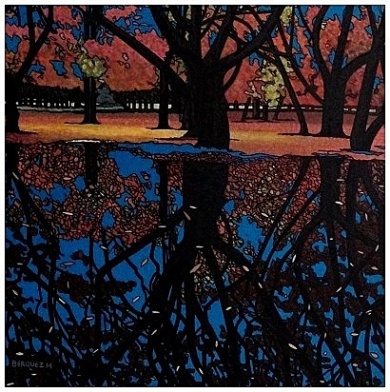
Vincent Berquez painting ©: Japanese River
Vincent Berquez is a London–based artist and poet
fleursdumal.nl magazine for art & literature
More in: Berquez, Vincent, FDM Art Gallery, Vincent Berquez
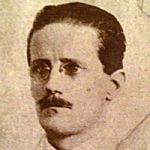
Lean Out of the Window
Lean out of the window,
Goldenhair,
I hear you singing
A merry air.
My book was closed,
I read no more,
Watching the fire dance
On the floor.
I have left my book,
I have left my room,
For I heard you singing
Through the gloom.
Singing and singing
A merry air,
Lean out of the window,
Goldenhair.
James Joyce
(1882-1941)
Lean Out of the Window
fleursdumal.nl magazine
More in: Archive I-J, Archive I-J, Joyce, James, Joyce, James
Mels ligt op zijn rug op de bodem van de boot en kijkt naar de lucht. De pluimen van het riet glijden voorbij en aaien hem over zijn wang. Vogels vliegen over. Als je op je rug ligt, lijkt de wijde ruimte van de hemel heel dichtbij. Hij voelt zich het middelpunt van de grote blauwe koepel boven zich.
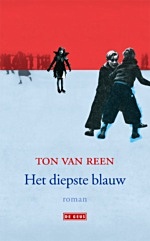 Het bootje haakt vast in het riet en ligt stil. De stroom ruist langs. Het water borrelt onder de boeg. Het lijkt op het rochelen van een man. Is er iemand in de buurt?
Het bootje haakt vast in het riet en ligt stil. De stroom ruist langs. Het water borrelt onder de boeg. Het lijkt op het rochelen van een man. Is er iemand in de buurt?
Hij gaat rechtop zitten. Er is niemand. Het borrelen komt uit een putje van de bunker die verscholen ligt in het riet op de oever. Voor de oorlog hebben er Nederlandse soldaten in gezeten, in de oorlog Duitse. Na de bevrijding kwamen de soldaten er naar de hoeren die er in waren getrokken bij gebrek aan betere behuizing. Volgens grootvader Rudolf waren het zwerfsters die hun ziel aan de duivel hadden verkocht. Ze waren er alleen ‘s nachts. Overdag sliepen ze in het hooi bij een boer die hen er flink voor liet betalen.
Mels legt de boot vast aan een tak, stapt uit en klimt door het mitrailleurgat in de bunker. Muizen vluchten alle kanten op.
Hij veegt de spinnenwebben weg. Op de vloer liggen een paar verrotte matrassen. Die hoeren moeten vuile wijven zijn geweest. Lang hebben ze hier niet gezeten. Ze zijn opgepakt en weggebracht naar een tehuis voor arme meisjes, waar nonnen hen probeerden op te voeden tot huishoudsters en pastoorsmeiden. Dat laatste was wat grootvader Bernhard erover vertelde, maar volgens grootvader Rudolf waren ze gewoon naar de gevangenis gebracht.
Smeerlappen hebben gore tekeningen op de muren gemaakt. Vrouwen met de benen wijd. Kerels met een pik van een meter. Mels begrijpt waarom kinderen hier niet mogen komen.
Hij loopt terug naar de boot en roeit tegen de stroom in terug naar het dorp.
Van ver af ziet hij de oude Amerikaanse legervrachtwagens waarop de geraamtes van de zweefmolen en de carrousel liggen opgestapeld, onder kleurig zeildoek. Hij roeit vlugger. Over een paar dagen is het kermis. Al een paar jaar mag hij meehelpen met het opbouwen van de attracties.
Ton van Reen: Het diepste blauw (055)
wordt vervolgd
fleursdumal.nl magazine
More in: - Book Stories, - Het diepste blauw, Archive Q-R, Reen, Ton van
Bobby Parker’s Working Class Voodoo is an enterprise of dark metaphysics which exists in the same tradition as Thomas de Quincey and Elizabeth Bishop.
 Punishing, plaintive, improper, vitally comic, Parker employs a vibrato narrative deeply concerned with the cost of both journey and arrival, with the irresistible darkness of both humour and tragedy in contrast and counter to one another. In poems which push at questions of contemporary masculinity, of the domestic and of the bonds of family, our unreliability, our desires, our addictions and our weaknesses are both indulged and confronted. Yet where such commitment to the uncovering of artifice might be expected to provoke disdain,
Punishing, plaintive, improper, vitally comic, Parker employs a vibrato narrative deeply concerned with the cost of both journey and arrival, with the irresistible darkness of both humour and tragedy in contrast and counter to one another. In poems which push at questions of contemporary masculinity, of the domestic and of the bonds of family, our unreliability, our desires, our addictions and our weaknesses are both indulged and confronted. Yet where such commitment to the uncovering of artifice might be expected to provoke disdain,
Parker’s singing faith in human love is what these poems reveal. What is lost will be recovered, and what was thought impossible will be achieved, no matter the darkness, no matter the weight. Working Class Voodoo is a confessional and a challenge, and a swampy, seductive ride into the night.
Bobby Parker
Working Class Voodoo
Publisher: Offord Road Books
Poetry
Publ. 3 May 2018
Paperback
64pp
ISBN 978–1–999–93041–7
£10
new poetry
fleursdumal.nl magazine
More in: - Book News, Archive O-P, Art & Literature News, LIGHT VERSE, MODERN POETRY
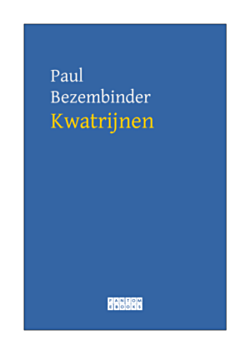

More in: - Book News, - Fantom Ebooks, Archive A-B, Art & Literature News, Bezembinder, Paul, PRESS & PUBLISHING

Caprice
Een gedicht zwicht niet voor het schuurpapier
van de logica en dus spoed ik mij op de cadans
van een stencilmachine in dromen door een stad
die het Milaan van Ermanno Olmi moet zijn.
Hoe er oogharen van Lombarden in hun keramiek
zijn beland, er verraad à gogo wordt gepleegd.
Beloftes aan het verleden hebben geen zin.
Bert Bevers
Gedicht: Caprice
Uit Andere taal, Uitgeverij Litera Este, Borgerhout, 2010
Bert Bevers is a poet and writer who lives and works in Antwerp (Be)
fleursdumal.nl magazine
More in: Archive A-B, Archive A-B, Bevers, Bert
Vandaag verschijnt het nieuwste deel in de reeks digitale publicaties van fleursdumal.nl, Fantom Ebooks. Fantom Ebooks nummer 2 is een werk van de Eindhovense dichter, schrijver en vertaler Paul Bezembinder, getiteld ‘Kwatrijnen. Filosofische Verkenningen’. De e-bundel omvat achttien filosofische en absurdistische kwatrijnen.
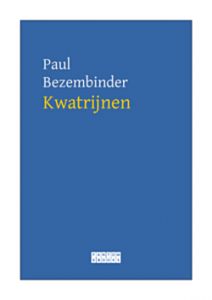 Bezembinder (1961) studeerde theoretische natuurkunde in Nijmegen. In zijn poëzie zoekt hij in vooral klassieke versvormen en thema’s naar de balans tussen serieuze poëzie, pastiche en smartlap. Zijn gedichten (Nederlands) en vertalingen (Russisch- Nederlands) verschenen in verschillende (online) literaire tijdschriften, waaronder fleursdumal.nl. Voorbeelden van zijn werk zijn ook te vinden op zijn website: www.paulbezembinder.nl
Bezembinder (1961) studeerde theoretische natuurkunde in Nijmegen. In zijn poëzie zoekt hij in vooral klassieke versvormen en thema’s naar de balans tussen serieuze poëzie, pastiche en smartlap. Zijn gedichten (Nederlands) en vertalingen (Russisch- Nederlands) verschenen in verschillende (online) literaire tijdschriften, waaronder fleursdumal.nl. Voorbeelden van zijn werk zijn ook te vinden op zijn website: www.paulbezembinder.nl
Fantom Ebooks is een uitgave van Art Brut Digital Editions en publiceert onregelmatig bijzondere kunst- en literatuurprojecten. Deel 3 verschijnt eind 2018. Fantom Ebooks nummer 1 is de bundel OVERVLOED van dichter Bert Bevers. Deze bevat tien verschillende vertalingen van het gedicht ‘Overvloed’ van Bert Bevers.
PAUL BEZEMBINDER
KWATRIJNEN
Filosofische Verkenningen
FANTOM EBOOKS
Art Brut Digital Editions
Series Fantom Ebooks
www.fleursdumal.nl
FANTOM 2
Fantom Ebooks 2018
ISBN: 978-90-76326-10-8
NUR 306
1ste PDF-uitgave FANTOM2, Juni 2018
GRATIS te downloaden via onderstaande LINK
fleursdumal.nl magazine
More in: - Book Lovers, - Book News, - Fantom Ebooks, Archive A-B, Art & Literature News, Bezembinder, Paul, PRESS & PUBLISHING
Mels veegt het angstzweet uit zijn nek. Werktuiglijk klopt hij zijn schouders af. Hij kijkt naar de silo verderop. Er is geen vliegtuig tegenaan gevlogen. Hij zit in zijn rolstoel langs de Wijer. Hij is helemaal alleen.
 Hij kijkt in het water dat tegen de pilaren van de brug kolkt. Zijn ogen volgen blaadjes die mee glijden in de stroom. Tot ze plotseling worden aangezogen door een kolk en in de spiraal naar beneden worden gedrukt, gevangen in een trechter van water. Wat kan hij doen om ze te bevrijden?
Hij kijkt in het water dat tegen de pilaren van de brug kolkt. Zijn ogen volgen blaadjes die mee glijden in de stroom. Tot ze plotseling worden aangezogen door een kolk en in de spiraal naar beneden worden gedrukt, gevangen in een trechter van water. Wat kan hij doen om ze te bevrijden?
Hij weet dat het door zijn eigen gevoel van gevangenschap komt. Zijn gebonden zijn doet hem meeleven met alles wat onvrij is. Wat zou hij graag, net als vroeger, in een bootje met de stroom mee drijven. Zomaar naar nergens. Net zo lang tot het bootje ergens vast komt te zitten in de begroeiing van de oever.
Zijn ogen volgen een stuk hout dat snel aan komt drijven. Te groot om te worden aangezogen, snelt het langs de kolken en duikt onder de brug door.
Ton van Reen: Het diepste blauw (054)
wordt vervolgd
fleursdumal.nl magazine
More in: - Book Stories, - Het diepste blauw, Archive Q-R, Reen, Ton van
 Poëzie in Mickery
Poëzie in Mickery
Halbo C. Kools poëzieavonden in 1966
Niels Bokhove
Literair Leeuwarden (I)
Schrijvers die sporen nalieten
Pieter de Groot
Big Brother heeft bestaan
Marco Daane
J. van Oudshoorn en een hongerkunstenaar
Jan Paul Hinrichs
‘Puur pooierachtige diefstal’
Nico Keuning
Constantinopel-Scheveningen
Een uniek liefdadigheidsalbum van Philippe Zilcken
Jaap Versteegh
Berliner Beobachter
Deutschsprachige Gemeinschaft Belgiens
Hans Olink
Schoon & haaks
Jan Paul Hinrichs
De Laatste Pagina
Oscar Timmers (1931-2018)
Paul Arnoldusse
Literair Leeuwarden
In drie nummers besteedt De Parelduiker aandacht aan het feit dat Leeuwarden dit jaar Culturele hoofdstad van Europa is. Literair Leeuwarden wordt, steeds vanuit een andere invalshoek en door een andere auteur, onder de loep genomen. Om te beginnen met de negentiende eeuw: de gebroeders Halbertsma uit Grou, François HaverSchmidt, Pieter Jelles Troelstra, Nienke van Hichtum en, niet te vergeten, Trui Jentink, ‘de pruttelende koffiekan van de Romkeslaan’, feministe van het eerste uur. Het begin van een mooie Leeuwarder literatuurgeschiedenis in vogelvlucht.
Boudewijn de Groot en Lennaert Nijgh in Mickery Loenersloot
Dichter Halbo C. Kool, door tekstdichter Lennaert Nijgh als ‘een wonderkind van 60’ bezongen, probeerde het succes van Poëzie in Carré (1966) een vervolg te geven met zijn poëzieavonden in het pas geopende Mickery-theater van Ritsaert ten Cate in Loenersloot. Na het eerste optreden van Nina Simone in Nederland aldaar mochten Lennaert Nijgh en zanger Boudewijn de Groot optreden in Mickery met hun cyclus Voor de overlevenden, te midden van dichterscoryfeeën als Clara Eggink, Theun de Vries, Remco Campert, A. Roland Holst, Gerrit Kouwenaar en Fritzi Harmsen van Beek. Mede door de slechte bereikbaarheid – al reed er een speciale bus van het Leidse Bosje – werden de avonden geen succes.
De Parelduiker 2018/2
ISBN 9789059375161
€ 12,50
80 pagina’s
geïllustreerd
# Website Uitgeverij Bas Lubberhuizen
Literair tijdschrift De Parelduiker
fleursdumal.nl magazine
More in: - Book Stories, Art & Literature News, LITERARY MAGAZINES, MONTAIGNE, PRESS & PUBLISHING
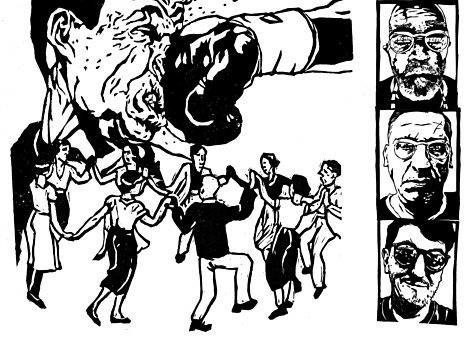
Nicht verloren laufen
Een boek met lino’s van Walter Kerkhofs en Ivo van Leeuwen.
Handgedrukt, oplage 70.
Gebonden door Liesbeth Huyben
Grafiek expositie met werk van Walter Kerkhofs en Ivo van Leeuwen. Verder is naast grafiek van boven genoemde kunstenaars, ook werk te zien van de Hamburgse kunstenaar: Dragan Prgomelja.
Tijdens de presentatie worden drie muziekstukken uitgevoerd, die werden gecomponeerd door Frans Kerkhofs op gedichten van Nabokov.
Uitvoerenden: Lizette van Beek, mezzo-sopraan en Doré van Deijk, piano.
Nicht verloren laufen
16 juni 2018 op 16.00 uur
NS-Plein 16, Tilburg
Expositie open 17/23/14 juni van 12.00 tot 17.00
new art work
fleursdumal.nl magazine
More in: # Music Archive, - Book Lovers, - Book News, Art & Literature News, Exhibition Archive, Ivo van Leeuwen, PRESS & PUBLISHING
An unspeakable crime. A confounding investigation. At a time when the King brand has never been stronger, he has delivered one of his most unsettling and compulsively readable stories.
 An eleven-year-old boy’s violated corpse is found in a town park. Eyewitnesses and fingerprints point unmistakably to one of Flint City’s most popular citizens. He is Terry Maitland, Little League coach, English teacher, husband, and father of two girls. Detective Ralph Anderson, whose son Maitland once coached, orders a quick and very public arrest. Maitland has an alibi, but Anderson and the district attorney soon add DNA evidence to go with the fingerprints and witnesses. Their case seems ironclad.
An eleven-year-old boy’s violated corpse is found in a town park. Eyewitnesses and fingerprints point unmistakably to one of Flint City’s most popular citizens. He is Terry Maitland, Little League coach, English teacher, husband, and father of two girls. Detective Ralph Anderson, whose son Maitland once coached, orders a quick and very public arrest. Maitland has an alibi, but Anderson and the district attorney soon add DNA evidence to go with the fingerprints and witnesses. Their case seems ironclad.
As the investigation expands and horrifying answers begin to emerge, King’s propulsive story kicks into high gear, generating strong tension and almost unbearable suspense. Terry Maitland seems like a nice guy, but is he wearing another face? When the answer comes, it will shock you as only Stephen King can.
Stephen King is the author of more than fifty books, all of them worldwide bestsellers. His recent work includes The Bill Hodges Trilogy, Revival, and Doctor Sleep. His novel 11/22/63 was named a top ten book of 2011 by The New York Times Book Review and won the Los Angeles Times Book Prize for Mystery/Thriller as well as the Best Hardcover Book Award from the International Thriller Writers Association. He is the recipient of the 2003 National Book Foundation Medal for Distinguished Contribution to American Letters. He lives in Bangor, Maine, with his wife, novelist Tabitha King.
The Outsider
A Novel
By Stephen King (Author)
Language: English
Genre Horror, Crime fiction
Published: May 22, 2018
Publisher: Scribner
Media type Print (hardcover)
Pages 576
ISBN-10: 1501180983
ISBN 978-1501180989
Price $18.90
new books
fleursdumal.nl magazine
More in: - Book News, Archive K-L, Art & Literature News, Stephen King, Tales of Mystery & Imagination, Thrillers
 Edgar Allan Poe
Edgar Allan Poe
The Cask of Amontillado
The thousand injuries of Fortunato I had borne as I best could, but when he ventured upon insult I vowed revenge. You, who so well know the nature of my soul, will not suppose, however, that gave utterance to a threat. At length I would be avenged; this was a point definitely, settled but the very definitiveness with which it was resolved precluded the idea of risk. I must not only punish but punish with impunity. A wrong is unredressed when retribution overtakes its redresser. It is equally unredressed when the avenger fails to make himself felt as such to him who has done the wrong.
It must be understood that neither by word nor deed had I given Fortunato cause to doubt my good will. I continued, as was my in to smile in his face, and he did not perceive that my to smile now was at the thought of his immolation.
He had a weak point this Fortunato although in other regards he was a man to be respected and even feared. He prided himself on his connoisseurship in wine. Few Italians have the true virtuoso spirit. For the most part their enthusiasm is adopted to suit the time and opportunity, to practise imposture upon the British and Austrian millionaires. In painting and gemmary, Fortunato, like his countrymen, was a quack, but in the matter of old wines he was sincere. In this respect I did not differ from him materially; I was skilful in the Italian vintages myself, and bought largely whenever I could.
It was about dusk, one evening during the supreme madness of the carnival season, that I encountered my friend. He accosted me with excessive warmth, for he had been drinking much. The man wore motley. He had on a tight-fitting parti-striped dress, and his head was surmounted by the conical cap and bells. I was so pleased to see him that I thought I should never have done wringing his hand.
I said to him “My dear Fortunato, you are luckily met. How remarkably well you are looking to-day. But I have received a pipe of what passes for Amontillado, and I have my doubts.”
“How?” said he. “Amontillado, A pipe? Impossible! And in the middle of the carnival!”
“I have my doubts,” I replied; “and I was silly enough to pay the full Amontillado price without consulting you in the matter. You were not to be found, and I was fearful of losing a bargain.”
“Amontillado!”
“I have my doubts.”
“Amontillado!”
“And I must satisfy them.”
“Amontillado!”
“As you are engaged, I am on my way to Luchresi. If any one has a critical turn it is he. He will tell me ”
“Luchresi cannot tell Amontillado from Sherry.”
“And yet some fools will have it that his taste is a match for your own.
“Come, let us go.”
“Whither?”
“To your vaults.”
“My friend, no; I will not impose upon your good nature. I perceive you have an engagement. Luchresi”
“I have no engagement; come.”
“My friend, no. It is not the engagement, but the severe cold with which I perceive you are afflicted. The vaults are insufferably damp. They are encrusted with nitre.”
“Let us go, nevertheless. The cold is merely nothing. Amontillado! You have been imposed upon. And as for Luchresi, he cannot distinguish Sherry from Amontillado.”
Thus speaking, Fortunato possessed himself of my arm; and putting on a mask of black silk and drawing a roquelaire closely about my person, I suffered him to hurry me to my palazzo.
There were no attendants at home; they had absconded to make merry in honour of the time. I had told them that I should not return until the morning, and had given them explicit orders not to stir from the house. These orders were sufficient, I well knew, to insure their immediate disappearance, one and all, as soon as my back was turned.
I took from their sconces two flambeaux, and giving one to Fortunato, bowed him through several suites of rooms to the archway that led into the vaults. I passed down a long and winding staircase, requesting him to be cautious as he followed. We came at length to the foot of the descent, and stood together upon the damp ground of the catacombs of the Montresors.
The gait of my friend was unsteady, and the bells upon his cap jingled as he strode.
“The pipe,” he said.
“It is farther on,” said I; “but observe the white web-work which gleams from these cavern walls.”
He turned towards me, and looked into my eves with two filmy orbs that distilled the rheum of intoxication.
“Nitre?” he asked, at length.
“Nitre,” I replied. “How long have you had that cough?”
“Ugh! ugh! ugh! ugh! ugh! ugh! ugh! ugh! ugh! ugh! ugh! ugh! ugh! ugh! ugh!”
My poor friend found it impossible to reply for many minutes.
“It is nothing,” he said, at last.
“Come,” I said, with decision, “we will go back; your health is precious. You are rich, respected, admired, beloved; you are happy, as once I was. You are a man to be missed. For me it is no matter. We will go back; you will be ill, and I cannot be responsible. Besides, there is Luchresi ”
“Enough,” he said; “the cough’s a mere nothing; it will not kill me. I shall not die of a cough.”
“True true,” I replied; “and, indeed, I had no intention of alarming you unnecessarily but you should use all proper caution. A draught of this Medoc will defend us from the damps.
Here I knocked off the neck of a bottle which I drew from a long row of its fellows that lay upon the mould.
“Drink,” I said, presenting him the wine.
He raised it to his lips with a leer. He paused and nodded to me familiarly, while his bells jingled.
“I drink,” he said, “to the buried that repose around us.”
“And I to your long life.”
He again took my arm, and we proceeded.
“These vaults,” he said, “are extensive.”
“The Montresors,” I replied, “were a great and numerous family.”
“I forget your arms.”
“A huge human foot d’or, in a field azure; the foot crushes a serpent rampant whose fangs are imbedded in the heel.”
“And the motto?”
“Nemo me impune lacessit.”
“Good!” he said.
The wine sparkled in his eyes and the bells jingled. My own fancy grew warm with the Medoc. We had passed through long walls of piled skeletons, with casks and puncheons intermingling, into the inmost recesses of the catacombs. I paused again, and this time I made bold to seize Fortunato by an arm above the elbow.
“The nitre!” I said; “see, it increases. It hangs like moss upon the vaults. We are below the river’s bed. The drops of moisture trickle among the bones. Come, we will go back ere it is too late. Your cough ”
“It is nothing,” he said; “let us go on. But first, another draught of the Medoc.” I broke and reached him a flagon of De Grave. He emptied it at a breath. His eyes flashed with a fierce light. He laughed and threw the bottle upwards with a gesticulation I did not understand. I looked at him in surprise. He repeated the movement a grotesque one.
“You do not comprehend?” he said.
“Not I,” I replied.
“Then you are not of the brotherhood.”
“How?”
“You are not of the masons.”
“Yes, yes,” I said; “yes, yes.”
“You? Impossible! A mason?”
“A mason,” I replied.
“A sign,” he said, “a sign.”
“It is this,” I answered, producing from beneath the
folds of my roquelaire a trowel.
“You jest,” he exclaimed, recoiling a few paces.
“But let us proceed to the Amontillado.”
“Be it so,” I said, replacing the tool beneath the cloak and again offering him my arm. He leaned upon it heavily. We continued our route in search of the Amontillado. We passed through a range of low arches, descended, passed on, and descending again, arrived at a deep crypt, in which the foulness of the air caused our flambeaux rather to glow than flame.
At the most remote end of the crypt there appeared another less spacious. Its walls had been lined with human remains, piled to the vault overhead, in the fashion of the great catacombs of Paris. Three sides of this interior crypt were still ornamented in this manner. From the fourth side the bones had been thrown down, and lay promiscuously upon the earth, forming at one point a mound of some size. Within the wall thus exposed by the displacing of the bones, we perceived a still interior crypt or recess, in depth about four feet, in width three, in height six or seven. It seemed to have been constructed for no especial use within itself, but formed merely the interval between two of the colossal supports of the roof of the catacombs, and was backed by one of their circumscribing walls of solid granite.
It was in vain that Fortunato, uplifting his dull torch, endeavoured to pry into the depth of the recess. Its termination the feeble light did not enable us to see.
“Proceed,” I said; “herein is the Amontillado. As for Luchresi ”
“He is an ignoramus,” interrupted my friend, as he stepped unsteadily forward, while I followed immediately at his heels. In niche, and finding an instant he had reached the extremity of the niche, and finding his progress arrested by the rock, stood stupidly bewildered. A moment more and I had fettered him to the granite. In its surface were two iron staples, distant from each other about two feet, horizontally. From one of these depended a short chain, from the other a padlock. Throwing the links about his waist, it was but the work of a few seconds to secure it. He was too much astounded to resist. Withdrawing the key I stepped back from the recess.
“Pass your hand,” I said, “over the wall; you cannot help feeling the nitre. Indeed, it is very damp. Once more let me implore you to return. No? Then I must positively leave you. But I must first render you all the little attentions in my power.”
“The Amontillado!” ejaculated my friend, not yet recovered from his astonishment.
“True,” I replied; “the Amontillado.”
As I said these words I busied myself among the pile of bones of which I have before spoken. Throwing them aside, I soon uncovered a quantity of building stone and mortar. With these materials and with the aid of my trowel, I began vigorously to wall up the entrance of the niche.
I had scarcely laid the first tier of the masonry when I discovered that the intoxication of Fortunato had in a great measure worn off. The earliest indication I had of this was a low moaning cry from the depth of the recess. It was not the cry of a drunken man. There was then a long and obstinate silence. I laid the second tier, and the third, and the fourth; and then I heard the furious vibrations of the chain. The noise lasted for several minutes, during which, that I might hearken to it with the more satisfaction, I ceased my labours and sat down upon the bones. When at last the clanking subsided, I resumed the trowel, and finished without interruption the fifth, the sixth, and the seventh tier. The wall was now nearly upon a level with my breast. I again paused, and holding the flambeaux over the mason-work, threw a few feeble rays upon the figure within.
A succession of loud and shrill screams, bursting suddenly from the throat of the chained form, seemed to thrust me violently back. For a brief moment I hesitated, I trembled. Unsheathing my rapier, I began to grope with it about the recess; but the thought of an instant reassured me. I placed my hand upon the solid fabric of the catacombs, and felt satisfied. I reapproached the wall; I replied to the yells of him who clamoured. I re-echoed, I aided, I surpassed them in volume and in strength.
I did this, and the clamourer grew still. It was now midnight, and my task was drawing to a close. I had completed the eighth, the ninth and the tenth tier. I had finished a portion of the last and the eleventh; there remained but a single stone to be fitted and plastered in. I struggled with its weight; I placed it partially in its destined position. But now there came from out the niche a low laugh that erected the hairs upon my head. It was succeeded by a sad voice, which I had difficulty in recognizing as that of the noble Fortunato.
The voice said–
“Ha! ha! ha! he! he! he! a very good joke, indeed an excellent jest. We will have many a rich laugh about it at the palazzo he! he! he! over our wine he! he! he!”
“The Amontillado!” I said.
“He! he! he! he! he! he! yes, the Amontillado. But is it not getting late? Will not they be awaiting us at the palazzo, the Lady Fortunato and the rest? Let us be gone.”
“Yes,” I said, “let us be gone.”
“For the love of God, Montresor!”
“Yes,” I said, “for the love of God!”
But to these words I hearkened in vain for a reply.
I grew impatient. I called aloud
“Fortunato!”
No answer. I called again
“Fortunato!”
No answer still. I thrust a torch through the remaining aperture and let it fall within. There came forth in return only a jingling of the bells. My heart grew sick; it was the dampness of the catacombs that made it so. I hastened to make an end of my labour. I forced the last stone into its position; I plastered it up. Against the new masonry I re-erected the old rampart of bones. For the half of a century no mortal has disturbed them.
In pace requiescat!
Edgar Allan Poe (1809 – 1849)
The Cask of Amontillado
fleursdumal.nl magazine
More in: Edgar Allan Poe, Poe, Edgar Allan, Poe, Edgar Allan, Tales of Mystery & Imagination
Thank you for reading Fleurs du Mal - magazine for art & literature